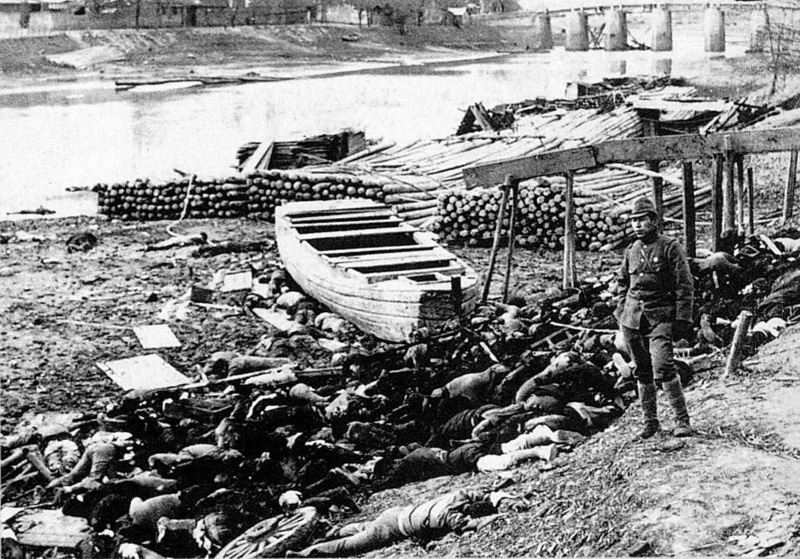 |
| The Nanjing Massacre resulted in the deaths of over 200,000 Chinese |
 |
| Mao is always watching. The text translates roughly to "Long live the People's Republic of China". |
Born and raised in the US, I've always associated "communist" with "evil", so I was surprised to find after doing some research that Mao was actually a significant leader in the Second World War. He allied with Chiang Kai-shek of the Kuomintang (who I originally viewed with more sympathy because he was not a communist) to drive out the Japanese with the help of guerrilla tactics and the United States' aid.
So an ally of the US must be good, right? Not quite. Following Japan's surrender to the Allies on September 2, 1945, Mao's Chinese Communist Party and Kai-shek's Kuomintang clashed, beginning the second portion of China's civil war (the first, 1927-1937, was interrupted by WWII). After an additional four years of war, Mao came out on top and created the People's Republic of China, forming the communist state we know today.
Overall, Mao's impact on China and the world is morally questionable. Yes, he improved the status of women and education standards in China; he increased life expectancy and modernized the nation. Yet, his 1960's Great Leap Forward and Cultural Revolution policies were massive failures. The former led to more than 45 million deaths. The latter was responsible for the Down to the Countryside Movement, in which Mao displaced 17 million "fortunate" youth to the rural countryside to experience a more "rustic" life. The work in the countryside was notorious for its unforgiving nature; my eldest aunt, who farmed from dawn until dusk, often went sleep hungry.
So, Mao contributed to the end of Japanese occupation of China, thus rendering my grandmother free from the xiao ri ben's grasp, but his actions nearly caused the starvation of my aunt.
In the end, much like everyone else on this earth, Mao was neither wholly good or evil, black or white. I leave it up to you to decide. After all, Mao and me, we've got a complicated relationship. -MC
So an ally of the US must be good, right? Not quite. Following Japan's surrender to the Allies on September 2, 1945, Mao's Chinese Communist Party and Kai-shek's Kuomintang clashed, beginning the second portion of China's civil war (the first, 1927-1937, was interrupted by WWII). After an additional four years of war, Mao came out on top and created the People's Republic of China, forming the communist state we know today.
Overall, Mao's impact on China and the world is morally questionable. Yes, he improved the status of women and education standards in China; he increased life expectancy and modernized the nation. Yet, his 1960's Great Leap Forward and Cultural Revolution policies were massive failures. The former led to more than 45 million deaths. The latter was responsible for the Down to the Countryside Movement, in which Mao displaced 17 million "fortunate" youth to the rural countryside to experience a more "rustic" life. The work in the countryside was notorious for its unforgiving nature; my eldest aunt, who farmed from dawn until dusk, often went sleep hungry.
 |
| Chinese propaganda for the Great Leap Forward. |
In the end, much like everyone else on this earth, Mao was neither wholly good or evil, black or white. I leave it up to you to decide. After all, Mao and me, we've got a complicated relationship. -MC
No comments:
Post a Comment